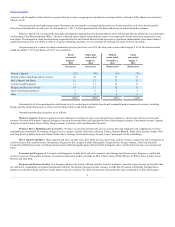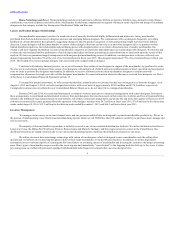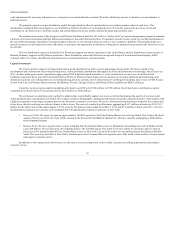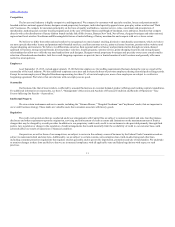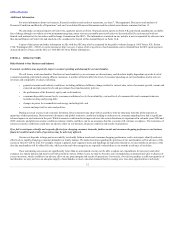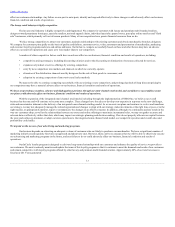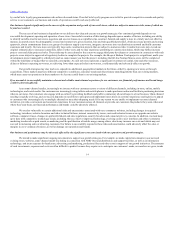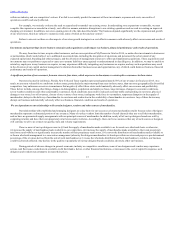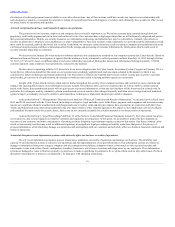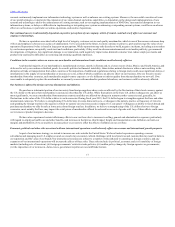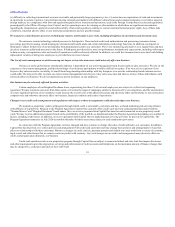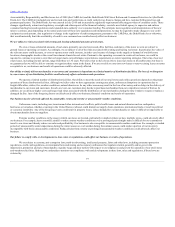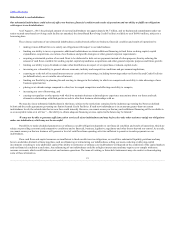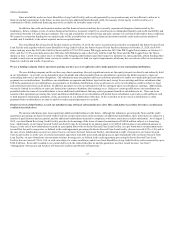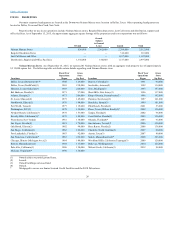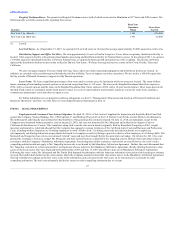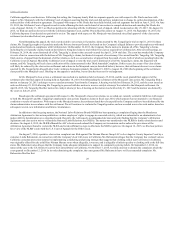Neiman Marcus 2014 Annual Report Download - page 19
Download and view the complete annual report
Please find page 19 of the 2014 Neiman Marcus annual report below. You can navigate through the pages in the report by either clicking on the pages listed below, or by using the keyword search tool below to find specific information within the annual report.
Table of Contents
(v) difficulty in collecting international accounts receivable and potentially longer payment cycles; (vi) restrictions on repatriation of cash and investments
in operations in certain countries; (vii) problems entering international markets with different cultural bases and consumer preferences; (viii) labor unrest in
foreign markets; (ix) compliance with laws and regulations applicable to international operations, such as the Foreign Corrupt Practices Act and regulations
promulgated by the Office of Foreign Asset Control; and (x) operating in new, developing or other markets in which there are significant uncertainties
regarding the interpretation, application and enforceability of laws and regulations relating to contract and intellectual property rights. Any of these risks
could have a material adverse effect on our international operations and our growth strategy.
We outsource certain business processes to third-party vendors, which subjects us to risks, including disruptions in our business and increased costs.
We outsource certain technology-related processes to third parties. These include credit card authorization and processing, insurance claims
processing, payroll processing, record keeping for retirement and benefit plans and certain information technology functions. In addition, we depend on
third-party vendors for delivery of our merchandise from manufacturers and to our customers. We review outsourcing alternatives on a regular basis and may
decide to outsource additional processes in the future. If third-party providers fail to meet our performance standards and expectations, including with respect
to data security, our reputation, sales and results of operations could be adversely affected. In addition, we could face increased costs associated with finding
replacement vendors or hiring new employees to provide these services in-house.
The loss of senior management or attrition among our buyers or key sales associates could adversely affect our business.
Our success in the global luxury merchandise industry is dependent on our senior management team, buyers and key sales associates. We rely on the
experience of our senior management, and their knowledge of our business and industry would be difficult to replace. If we were to lose a portion of our
buyers or key sales associates, our ability to benefit from long-standing relationships with key designers or to provide relationship-based customer service
could suffer. We may not be able to retain our current senior management team, buyers or key sales associates and the loss of any of these individuals could
adversely affect our business. We do not maintain key person insurance on any employee.
Our business may be adversely affected by union activities.
Certain employees of our Bergdorf Goodman stores, representing less than 1% of our total employees, are subject to a collective bargaining
agreement. We may experience pressure from labor unions or become the target of campaigns similar to those faced by our competitors, and the unionization
of a more significant portion of our workforce could increase the overall costs at the affected locations and adversely affect our flexibility to run our business
competitively and otherwise adversely affect our business, financial condition and results of operations.
Changes in our credit card arrangements and regulations with respect to those arrangements could adversely impact our business.
We maintain a proprietary credit card program through which credit is extended to customers and have a related marketing and servicing alliance
with affiliates of Capital One. Pursuant to the Program Agreement, Capital One currently offers credit cards and non-card payment plans under both the
"Neiman Marcus" and "Bergdorf Goodman" brand names. Also, we receive payments from Capital One based on sales transacted on our proprietary credit
cards. We may receive additional payments based on the profitability of the portfolio as determined under the Program Agreement depending on a number of
factors, including credit losses. In addition, we receive payments from Capital One for marketing and servicing activities we provide to Capital One. The
Program Agreement terminates in July 2020 (renewable thereafter for three-year terms), subject to early termination provisions.
In connection with the Program Agreement, we have changed and may continue to change the terms of credit offered to our customers. In addition,
Capital One has discretion over certain policies and arrangements with credit card customers and may change these policies and arrangements in ways that
affect our relationships with these customers. Moreover, changes in credit card use, payment patterns and default rates may result from a variety of economic,
legal, social and other factors that we cannot control or predict with certainty. Any such changes in our credit card arrangements may adversely affect our
credit card program and, ultimately, our business.
Credit card operations such as our proprietary program through Capital One are subject to numerous federal and state laws that impose disclosure
and other requirements upon the origination, servicing and enforcement of credit accounts and limitations on the maximum amount of finance charges that
may be charged by a credit provider such as the Credit Card
18


